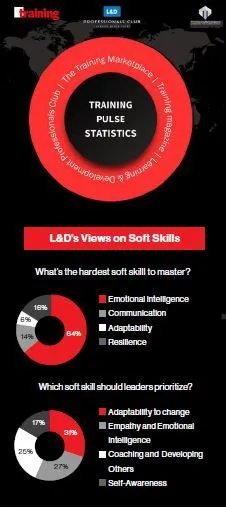This issue’s leading Training Pulse question —“What is the hardest soft skill to master?”— drew significant engagement, with more than 1,600 votes and hundreds of comments from across the learning and development (L&D) community. The results paint a clear picture of where today’s managers and teams continue to struggle most—and why.
EMOTIONAL INTELLIGENCE TAKES THE TOP SPOT
Emotional Intelligence (EI) emerged as the most difficult soft skill to master by a significant margin. Respondents described it as deeply personal, situational, and constantly tested—something that cannot be mastered in a classroom or through theory alone.
One AI-generated response summed up the structural side of the challenge, explaining that EI is “less knowledge than habit,” shaped by emotional patterns that harden over years and are intensified under stress. Changing them, it argued, demands deliberate practice, real-world feedback, and team reinforcement.
In contrast, Mia from Neupauer Ltd offered a more human lens, noting that emotions are complex and influenced by needs, personalities, and daily events— meaning short courses may only inform rather than transform. She advocates for “regular, bite-sized programs” that allow individuals to apply learning as emotional situations arise.
Both perspectives agree on the core truth: Emotional Intelligence is not taught once—it is built daily.
OTHER SKILLS ON THE SCALE
The poll also provided insight into the wider landscape of soft skills that leaders and trainers are grappling with:
• Resilience came in second at 16%. Respondents observed that emotional regulation often underpins performance in this area—reinforcing EI’s overarching importance.
• Communication likewise ranked way behind EI (14% vs. 64%), with many citing that clarity and empathy in communication are easy to preach but hard to practice—particularly under pressure or across cultures.

• Adaptability was at 6%, reflecting the post-pandemic reality that rapid change defines the modern workplace. Many respondents admitted that maintaining composure through uncertainty remains one of the greatest tests of professional maturity.
SKILLS PRIORITIZATION
Our next poll examined what skills teams thought their leaders should prioritize. With more than 400 respondents, the second poll results offer an interesting continuation of and contrast with the first poll.
In the initial poll, EI stood out as the hardest soft skill to master—it is seen as an ongoing, deeply personal journey rather than a teachable module. Yet in the second poll, when asked which skills leaders should prioritize, adaptability to change took the lead (31%), followed closely by empathy and Emotional Intelligence (27%) and coaching and developing others (25%).
This shift suggests that while individuals struggle most with Emotional Intelligence, they expect their leaders to focus on adaptability—the capacity to remain calm, decisive, and forward-thinking in uncertainty. However, the proximity of EI and coaching in the results shows that respondents recognize adaptability alone isn’t enough; leaders also must understand and develop people to navigate change effectively.
SIMPLY PUT
Poll 1 (Hardest Soft Skill to Master) shows where personal growth hits resistance—in emotional regulation and connection.
Poll 2 (Leadership Skills Priority) reflects that followers want leaders who can balance change with empathy and invest in others’ development.
Together, the two polls paint a picture of modern leadership: Technical agility is important, but it’s the emotional capacity to adapt, empathize, and coach that differentiates great leaders from competent ones.
It seems a reasonable conclusion is that we struggle most with the qualities we value most in our leaders.

